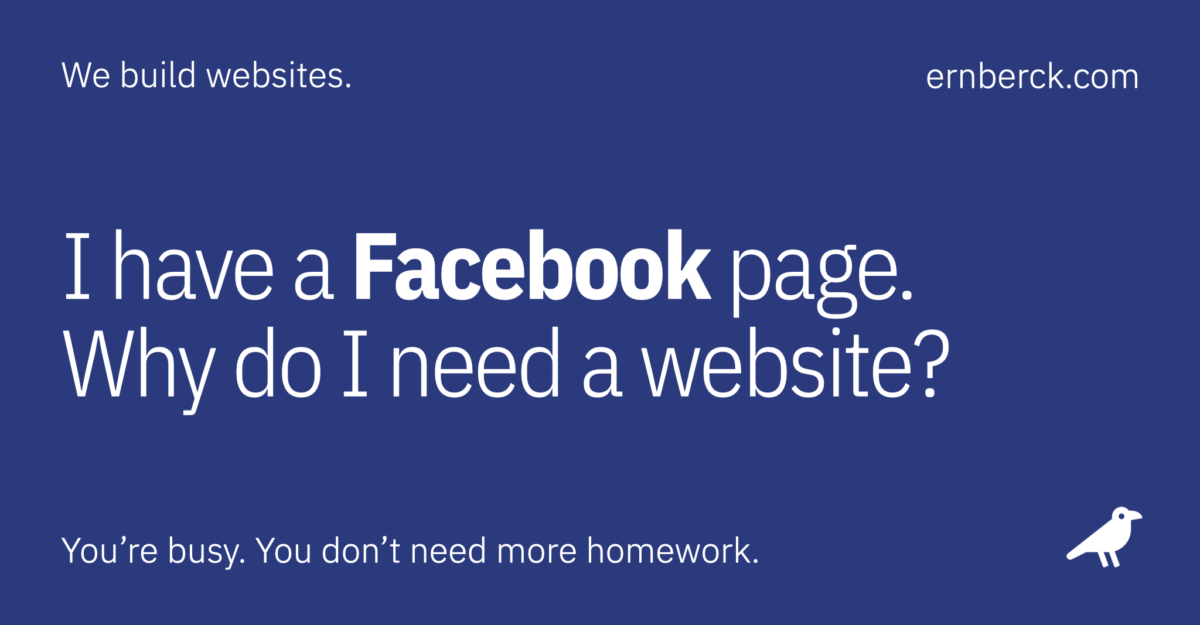There are dozens of digital marketing channels available to reach your audience, but none are more powerful than your own business website. Whether you’re selling products, services, memberships, or education, that’s where it all starts.
What is a Facebook business page?
A Facebook business page is a free platform on Facebook that allows businesses, brands, organizations, and public figures to establish an official presence.
These pages are distinct from personal profiles and serve as a way for businesses to connect with their audience, promote their products or services, and build a community around their brand.
Benefits of a Facebook business page
They’re free, simple to set up, and sort of easy to manage (used to be anyway). And with a monthly active user base of over 3.03 billion people worldwide, the social media behemoth provides business owners with the opportunity to reach hundreds of potential customers.
A Facebook business page provides an easy way for businesses to engage with their audience. You can answer questions, promote blog posts, post photos, and keep customers informed about your latest products and services.
Can a Facebook business page substitute for a website?
Probably not. If you own a small to midsize business (SMB), and you’re serious about establishing a successful online marketing presence, it’s going to take a lot more than comments, shares, and likes.
Even though a Facebook business page can be a powerful way to reach an audience, it won’t do nearly enough to help turn your business into a profitable, respectable brand. To do that kind of heavy lifting, you need a dedicated website.
10 reasons why you need a website:
01. Facebook posts are time sensitive
The typical lifespan of a Facebook post is about six hours. More specifically, broken down into engagement, impressions, and reach:
Engagement: 75% of post engagement (likes, comments, shares, etc) happens within the first five hours. After that, engagement pretty much dies off.
Impressions: After just 150 minutes (2 hours 30 minutes), your post will have made 75% of its lifetime impressions. In other words, your post has made the majority of impressions it will ever make in less than 3 hours.
Reach: After just 110 minutes (1 hour 50 minutes), your post reaches 75% of its potential reach. So, if your page has 1,000 fans and you’re reaching the average of 5.2% (see below) of followers, your post will reach 52 people. But 39 of those fans will be reached in the first 2 hours, while the remaining 11 will see your post over the hours that follow.
How far will you scroll?
With each new Facebook post that is created, the previous post gets pushed further down the page’s timeline until it’s no longer visible. To find it again, visitors will have to do some serious scrolling.
This is arguably the single biggest challenge facing all social media platforms. With more than 50% of all engagement happening on smartphones with dinky screens, they’re running out of space to place ads.
Unlike print advertising (newspapers, magazines, etc), which can just add more pages to accommodate more advertisers, that won’t work on tiny digital devices — folks won’t scroll forever. Consequently, the competition for viewable space is fierce, and the bidding-based ad platforms have put most online advertising out of reach for small businesses.
02. Declining reach
The days of depending solely on organic (free) posts to reach and expand your audience on Facebook are over. The reach of organic posts has been declining steadily since 2012.
In fact, between 2012 and 2014 organic reach dropped from 16% to 6.5%, and even as low as 2% for some industries. Today, average reach on Facebook is around 5.2%, and the engagement rate is about 0.25%.
03. Information retrieval is difficult
There’s no effective way to retrieve meaningful information on Facebook. The only search option you have is the standard search box that appears at the top of every page. If you’ve ever tried searching on a keyword with Facebook search, you know how clunky and ineffective it is.
Also, there’s no way to keep posts static or stationary, except for one post that can be pinned to the top of your page timeline. That might be okay if you only have one important thing to say, but most businesses require something more robust.

Mark Zuckerberg
“It’s not that every single thing that happens on Facebook is gonna be good. This is humanity. People use tools for good and bad, but I think that we have a clear responsibility to make sure that the good is amplified and to do everything we can to mitigate the bad.”
04. Limited SEO opportunities
On the subject of searching, a Facebook page offers little in terms of search engine optimization (SEO) opportunities other than simply being findable through search engines such as Google.
Since all Facebook business pages follow the same basic template, there’s virtually nothing that can be done to tailor content, layout, and keywords for better discoverability — Especially from organic searches.
And even if there were a way to optimize SEO on Facebook, visitors would still need to have an account to log in, access, and interact with the page beyond what they see on a search engine results page (SERP).
Account required
This point can’t be overstated. If people want to interact with your Facebook page — like, leave comments, ask questions, share posts — they’ll need a Facebook account to do so. In fact, on some devices, you may need an account just to view a page. Despite their enormous user base, a lot of people don’t want a Facebook account, and never will. Why would you want to exclude them?
05. Limited design options
In terms of design, navigation, and conversion, your options are extremely limited on a Facebook page. All a business can do is park its important information and a few design elements — such as pictures, photos, and logos — in their predetermined spots.
Also, you need to make sure that the image file type, size, and dimensions meet Facebook’s requirements and community guidelines — All of which are subject to change. This brings us to the most important reason of all.
06. Modest functionality
Independent websites can offer a wide range of flexible features and functionality that a Facebook page couldn’t possibly provide, including:
- Custom design and branding
- Content management
- Custom applications
- Analytics and tracking
- Domain and hosting control
- Email marketing integration
- Complex forms and surveys
- Memberships and restricted access
- File hosting and downloads
- Multi-language support
In short, websites offer a greater degree of customization, functionality, and control compared to Facebook business pages. This makes them essential for organizations that require advanced features, a strong online presence, and the ability to fully customize their digital identity. Plus, you don’t usually need to create an account to visit a website.
07. Weak credibility
A lot of customers and businesses consider a dedicated website to be a more professional and trustworthy online presence compared to relying solely on social media. Having both can enhance your credibility.
08. Your Facebook page belongs to Facebook
With its recent updates to its business pages, Facebook is on its way to establishing itself as a mini-web of sorts, where any individual or business can occupy a space — seemingly free of charge. And while no money might be involved, there is a price:
Anything created on Facebook belongs to Facebook first. Whoever set up the page or profile merely rents it.
As a business owner you might have access to some useful marketing and reporting tools, along with some creative latitude on content, but ultimately Facebook always has the last word. Your business page is still subject to all the rules, regulations, and algorithms that Facebook uses at its sole discretion.
As a result of this total control, no reward can be guaranteed for any efforts made to boost visitor engagement. All a “like” on a Facebook page means is that a user is interested in the page’s content. That’s it. They still have to engage with the page on a regular basis, or the Facebook algorithms will remove its posts from their timelines.
They own your audience
On any platform other than your website — whether it’s Instagram, YouTube, Facebook, or even Google search results — you don’t own your audience, they do. They control who sees your content and who doesn’t. And, when they decide to change their policies, strategies, or algorithms, you could lose much of your audience.
09. Your website belongs to you
A website, on the other hand, belongs to the business that created it. It is square one, the zero moment of truth; the raw material over which a designer has full, limitless creative control. You’re free to mold and shape it from scratch to meet your business needs, with little to no restrictions. Plus, it can be changed at will to adapt to shifting market conditions.
On your website, your business comes first. Any content you create, or tool you use, will be for the benefit of the business first. For every whiz-bang marketing tool that Facebook might offer on its platform, there is most likely a better, more robust counterpart that can easily be implemented on your website.
For example, suppose you have some special marketing materials that you would like to make available for download; you’ll need a website for that. If you try to do that on a Facebook page, all you’ll be able to do is create a post telling your audience where to find this information on your website. There is no place on Facebook to actually house documents for direct download.
10. Websites grow brands
What can a website tell a visitor? Anything and everything you want them to know about your business. Not just who you are, but also the where, when, and why of your business — In whatever way you’d like to tell them.
On a Facebook page, your business information is downgraded to the design equivalent of assigned seating. And if your small business wants to deviate from the rigid template that Facebook currently offers, the best it can do is get creative with images.
For example, you could upload a banner with some creative copy in it as a background image. There’s no way you can modify a Facebook page template.
With a website, there are no restrictions on your design elements. You make the rules. Every bit of content, from product information to photo galleries, videos, forms, and testimonials, can be strategically placed and rearranged for the best possible user experience.
As a result, your business will gain the maximum benefit from any visitor interaction, rather than just leaving things up to fate — As you’re forced to do on a Facebook page.
Build a great website first
There are dozens of digital marketing channels available to reach your audience, but none are more powerful — or give you more control — than your own business website. Whether you’re selling products, services, memberships, or education — your website is the zero moment of truth. That’s where it all starts.
As a small business, you might get by with a Facebook business page as your primary web presence. But we guarantee you will miss out on a lot of opportunities to flourish as a business. You might survive on Facebook, but you’ll thrive with a website.
Related
- Social media management
- The truth about social media engagement
- Dark social media
- Social proof explained
- Social media advocacy
Sources
Revised: October 9, 2024 at 8:23:34 AM PDT
